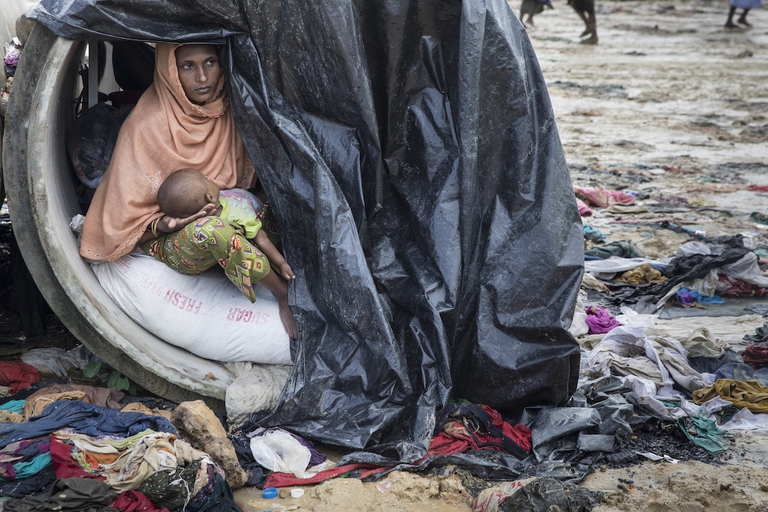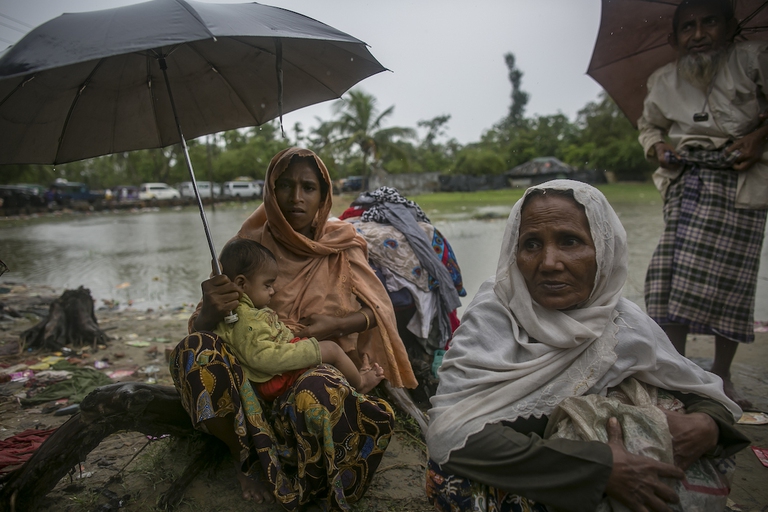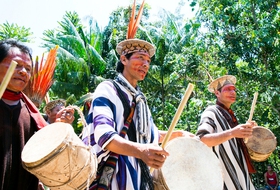
Costa Rica celebrated its first same-sex marriage when two women, Alexandra Quiros and Dunia Araya, celebrated their wedding: an “extraordinary moment”.
The Myanmar army has condemned a group of soldiers for human rights violations against the Rohingya people for the first time ever.
Seven soldiers have been sentenced to ten years in prison In Myanmar (formerly known as Burma) on 10 April for having taken part in a massacre of the Muslim Rohingya population. This has been announced by the army itself, an unprecedented event since the beginning of the crisis.
General Min Aung Hlaing has confirmed that “four officers and three soldiers were denounced and permanently dismissed from the military and sentenced to prison”, through a note published on a social network. This punishment carries an enormous symbolic value, since the Rohingya have been persecuted for many years. The first violent acts against this population occurred in 2012, and since then around 700,000 people were forced to escape their home lands.
Seven members of Myanmar’s military have been sentenced to prison terms with hard labor for killing 10 Rohingya men last year, state-run media reports https://t.co/AZvn83J1Y0
— CNN International (@cnni) 11 aprile 2018
The army has admitted that these soldiers carried out a series of “extrajudicial executions”, but denied this had anything to do with a plan for an ethnic cleansing (an accusation brought forth by the United Nations). The Rohingya were killed in cold blood, even though they were already being held prisoners, representing a blatant violation of human rights.
The soldiers were punished for the events that took place in the village of Inn Dinn, this incident was reported to the whole world by the Reuters news agency. The two journalists who followed this story, Wa Lone and Kyaw Soe Oo, were arrested in Myanmar last December and put on trial. The first news on the court’s decision arrived on 11 April: despite the international pressure, their charges were confirmed. Specifically, those for the “violation of the state’s Official Secrets Act.”
Reuters Journalists Will Face Trial for Work in Myanmar https://t.co/xfLbJBTNzt
— The New York Times (@nytimes) 11 aprile 2018
The judge declared that “the court has decided to reject the defence’s request to release the accused”, in front of a courtroom filled with diplomats and journalists. The two reporters are facing up to 14 years in prison: the trial will be resumed on 20 April.
Siamo anche su WhatsApp. Segui il canale ufficiale LifeGate per restare aggiornata, aggiornato sulle ultime notizie e sulle nostre attività.
![]()
Quest'opera è distribuita con Licenza Creative Commons Attribuzione - Non commerciale - Non opere derivate 4.0 Internazionale.
Costa Rica celebrated its first same-sex marriage when two women, Alexandra Quiros and Dunia Araya, celebrated their wedding: an “extraordinary moment”.
Rohingya women who have escaped from Myanmar are forced to live in brutal conditions and are victims of unspeakable violence. Someone who visited the refugee camps in Bangladesh told us about what they saw there.
The tragedy of people fleeing their lands in order to survive, have a future, and hope for a better life doesn’t involve only the Mediterranean Sea. On the other side of the world there are the Rohingya people, which are officially recognised by the United Nations as the world’s most persecuted and segregated population. The
On top of a 2.4 million dollar compensation, the indigenous Ashaninka people will receive an official apology from the companies who deforested their lands in the 1980s.
From Italy to the United States, workers in the logistics and delivery sectors are protesting to demand better sanitary conditions to protect themselves from Covid-19.
The pandemic and its restrictions are affecting everyone, without exceptions. However factors like housing, income inequalities, gender, access to technology and working conditions are influencing how people experience the health crisis.
In the midst of India’s coronavirus lockdown, two dozen people lost their lives in a desperate bid to return home: migrant labourers forced to leave the cities where they worked once starvation began knocking at their doors.
Apple, Dell, Microsoft and Tesla are among the tech companies named in a lawsuit brought in the US by the families of children killed and maimed in cobalt mining activities in the Democratic Republic of Congo.
We, the people is Survival’s 2020 calendar, which features the winners of the photography contest showcasing images of the world’s indigenous peoples.









